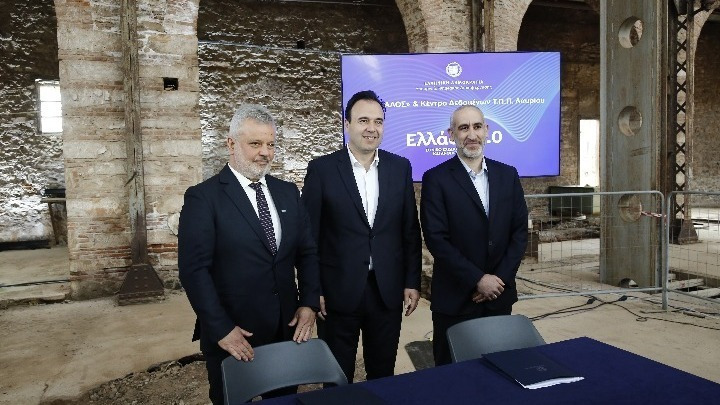In a landmark announcement for Greece’s technological future, Digital Governance Minister Dimitris Papastergiou revealed on Wednesday the launch of construction for the country’s cutting-edge supercomputer, named "Daedalus," alongside a new data centre in Lavrio.
Speaking at an event held at the Lavrio Technological Cultural Park—where the supercomputer will be housed—Papastergiou hailed the project as a pivotal step in positioning Greece at the forefront of the Fourth Industrial Revolution and the global artificial intelligence (AI) landscape.
The ambitious project, backed by a €58.9 million budget (including VAT), is a collaboration between the National Network of Technology and Research Infrastructure (GRNET SA)—an agency under the Digital Governance Ministry—and global tech giant Hewlett Packard Enterprise. MainSys SA will oversee the electrical and mechanical preparations for the site. Funded through the European Union’s NextGenerationEU initiative under Greece’s "Greece 2.0" Recovery and Resilience Plan, as well as the European High Performance Computing Joint Undertaking (EuroHPC JU), "Daedalus" is a cornerstone of the nation’s Digital Transition Book 2020-2025, aimed at bolstering Greece’s digital infrastructure.
A Historic Leap Forward
Papastergiou emphasised the symbolic significance of Lavrio, a town that played a key role in Greece’s industrial past 120 years ago during the Second Industrial Revolution. "From this historic site, we are taking a bold step into the era of AI," he said. "With 'Daedalus,' Greece is establishing itself as a pioneer in the responsible use of emerging technologies. This supercomputer will be among the most powerful in the world, forming the backbone of policies that will shape our country’s future through AI."
The minister highlighted that "Daedalus" was a decisive factor in Greece being selected as one of the first seven European nations to develop its own "AI factory." The supercomputer, boasting a performance of 89 Petaflops, will be 150 times more powerful than Greece’s current supercomputer, ARIS, and is expected to rank among the top 20 globally for both performance and energy efficiency, according to the TOP500 and GREEN500 lists. Designed with sustainability in mind, it will utilize renewable energy sources and advanced cooling systems to minimize its environmental footprint.
A Hub for Innovation
Set to be operational by early 2026, "Daedalus" will be housed in the Lavrio Technological Cultural Park, a historic former electricity plant and a protected industrial heritage site owned by the National Technical University of Athens. Spanning 1,500 square meters, the facility will also host the new Lavrio Data Centre, certified by the Uptime Institute for its reliability and availability. Together, they will serve as the computational heart of Greece’s AI Factory "Pharos," set to launch in April, which will drive advancements in fields like healthcare, environmental sustainability, culture, and language preservation.
The supercomputer’s capabilities are expected to revolutionise research and industry in Greece, offering unprecedented computing power to public institutions, universities, startups, and research centers. Applications will range from AI and big data analysis to advancements in medicine, meteorology, and smart transportation systems. "This is a game-changer for our research and business communities," Papastergiou noted. "It will empower young scientists to innovate and create solutions that benefit all citizens, propelling Greece’s growth."
A Collaborative Effort
The project will unfold in two phases, with GRNET coordinating efforts alongside Hewlett Packard Enterprise and MainSys SA. The event in Lavrio was attended by key figures, including GRNET Board President Professor Stefanos Kollias, Hewlett Packard Enterprise Greece and Cyprus Managing Director Michalis Kasimiotis, MainSys SA CEO Georgios Plavoukos, and EuroHPC national representative Nektarios Kozyris, among others.
With "Daedalus," Greece is not only enhancing its technological prowess but also cementing its place on the global map of high-performance computing. As Papastergiou concluded, "We are turning the page to a new digital era for Greece, built on solid foundations, ready to seize every opportunity AI has to offer."
(Source: Amna)
Stay updated with the latest news from Greece and around the world on greekcitytimes.com.
Contact our newsroom to share your updates, stories, photos, or videos. Follow GCT on Google News and Apple News.


